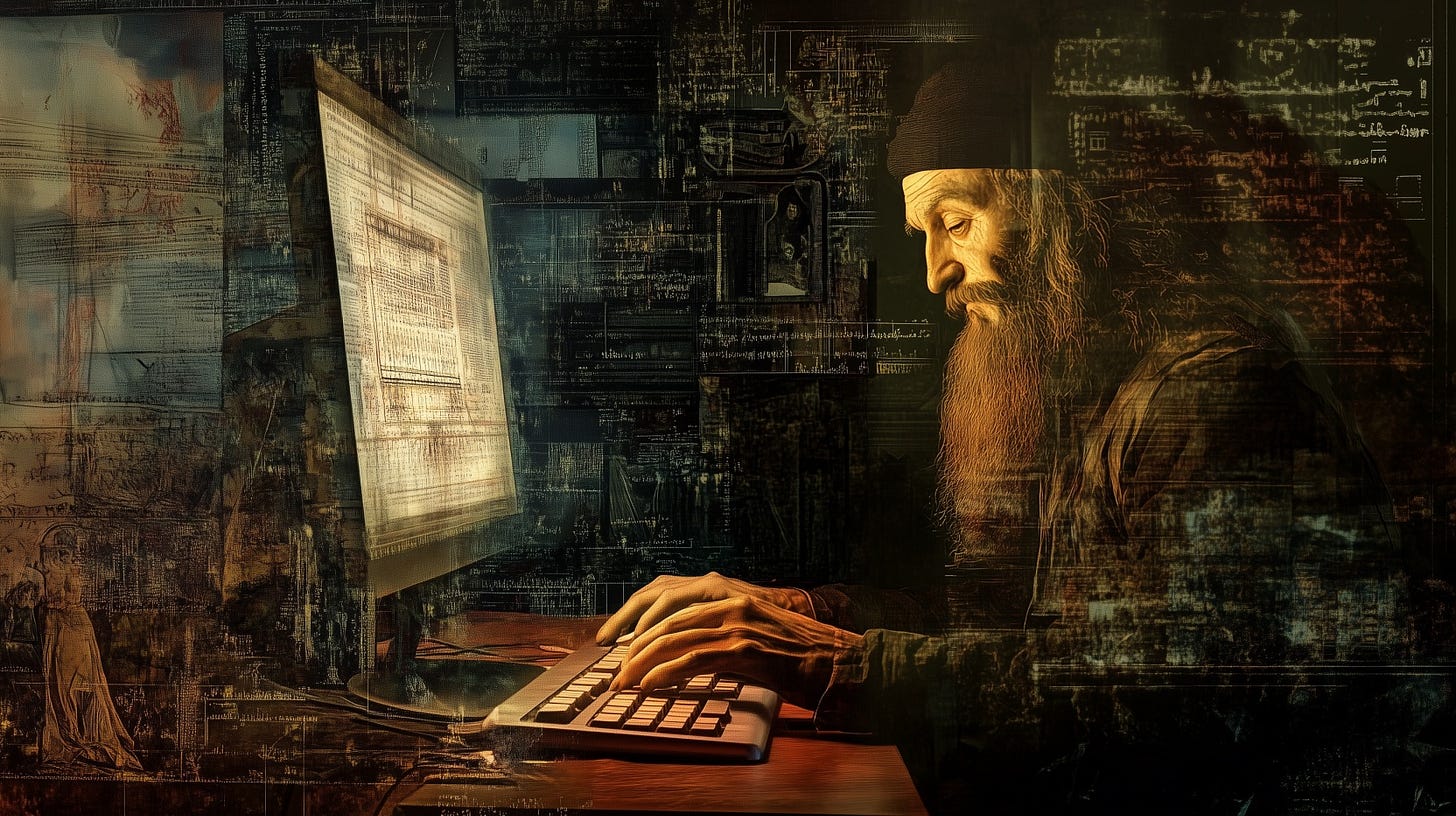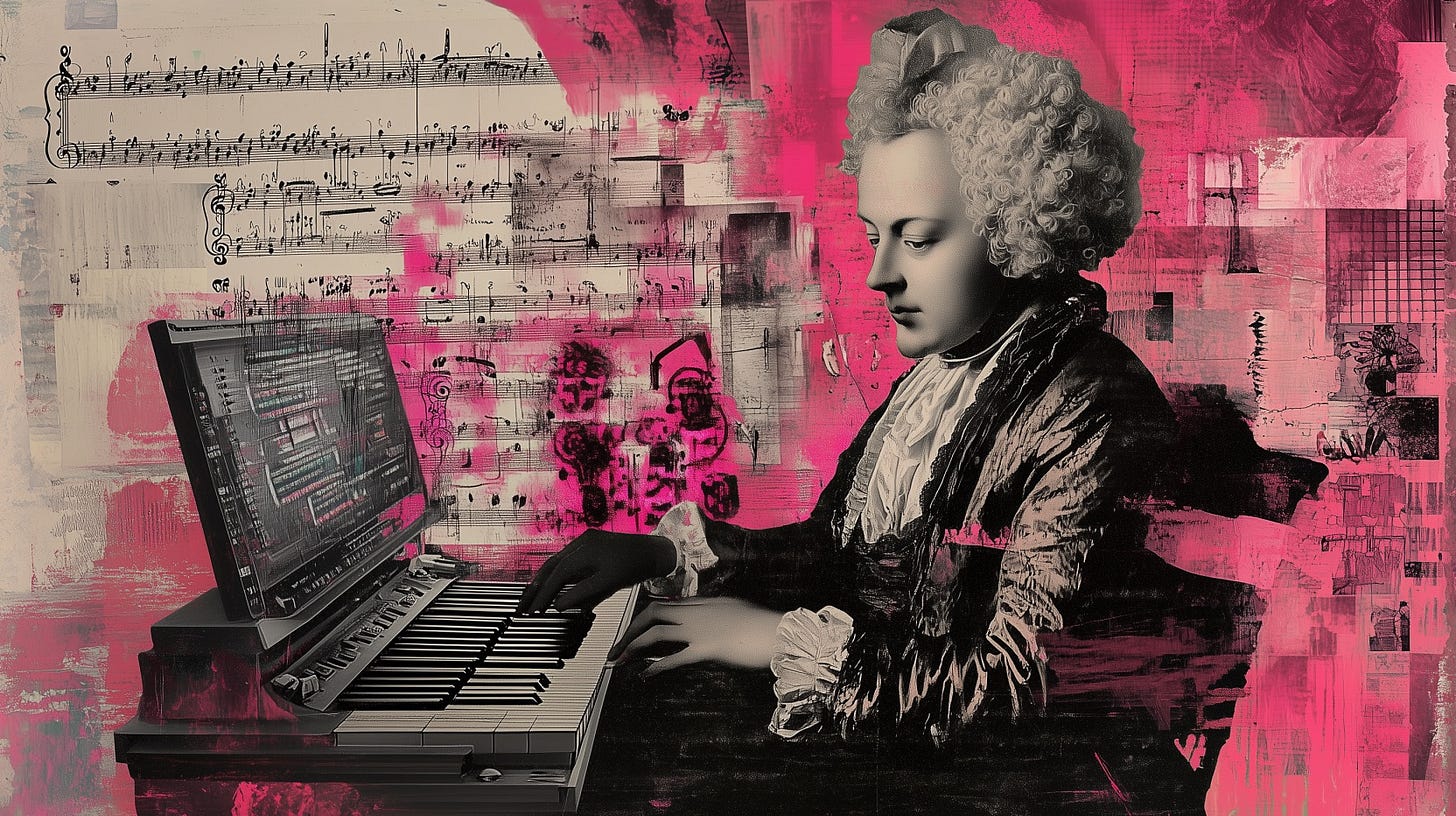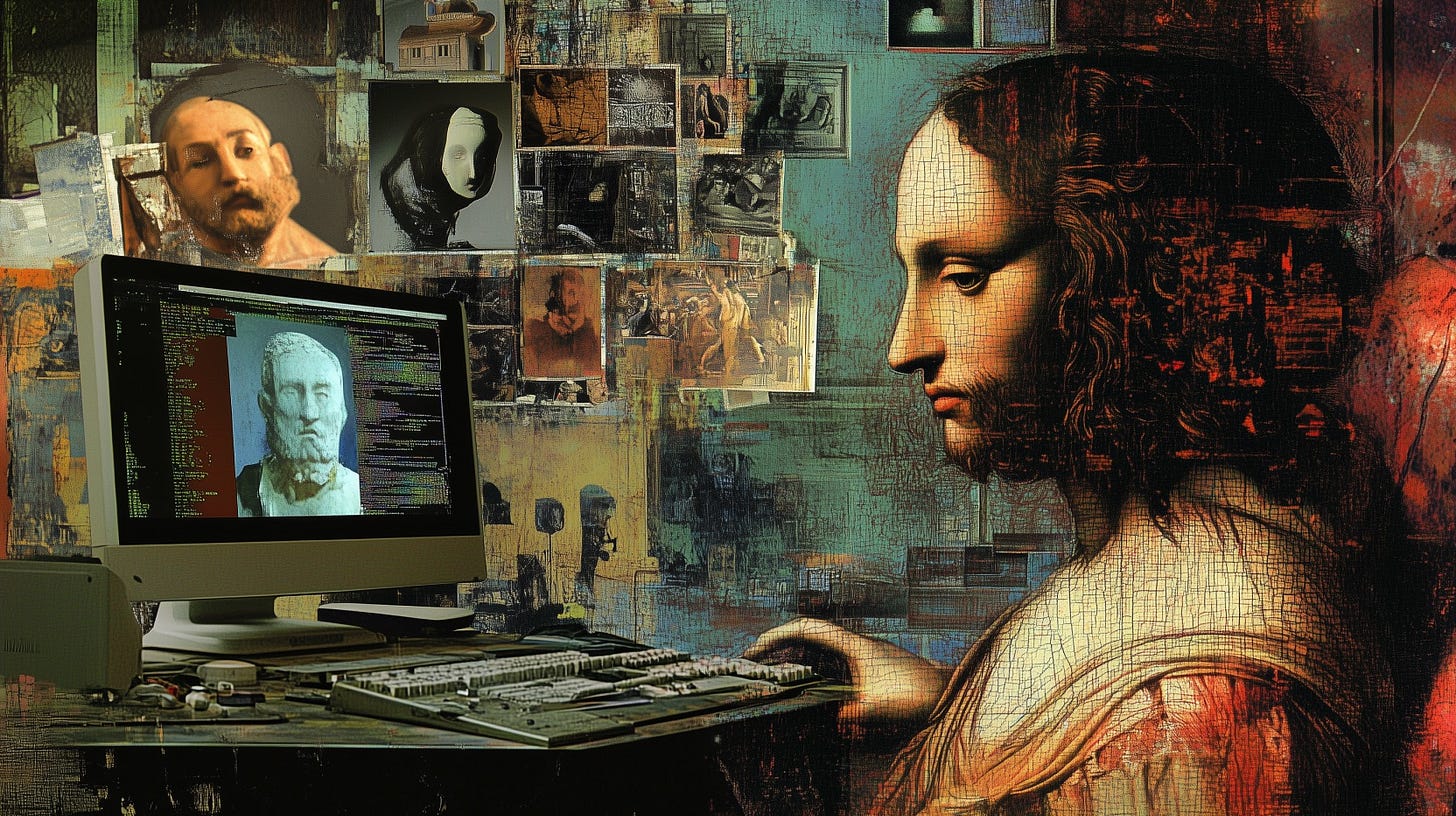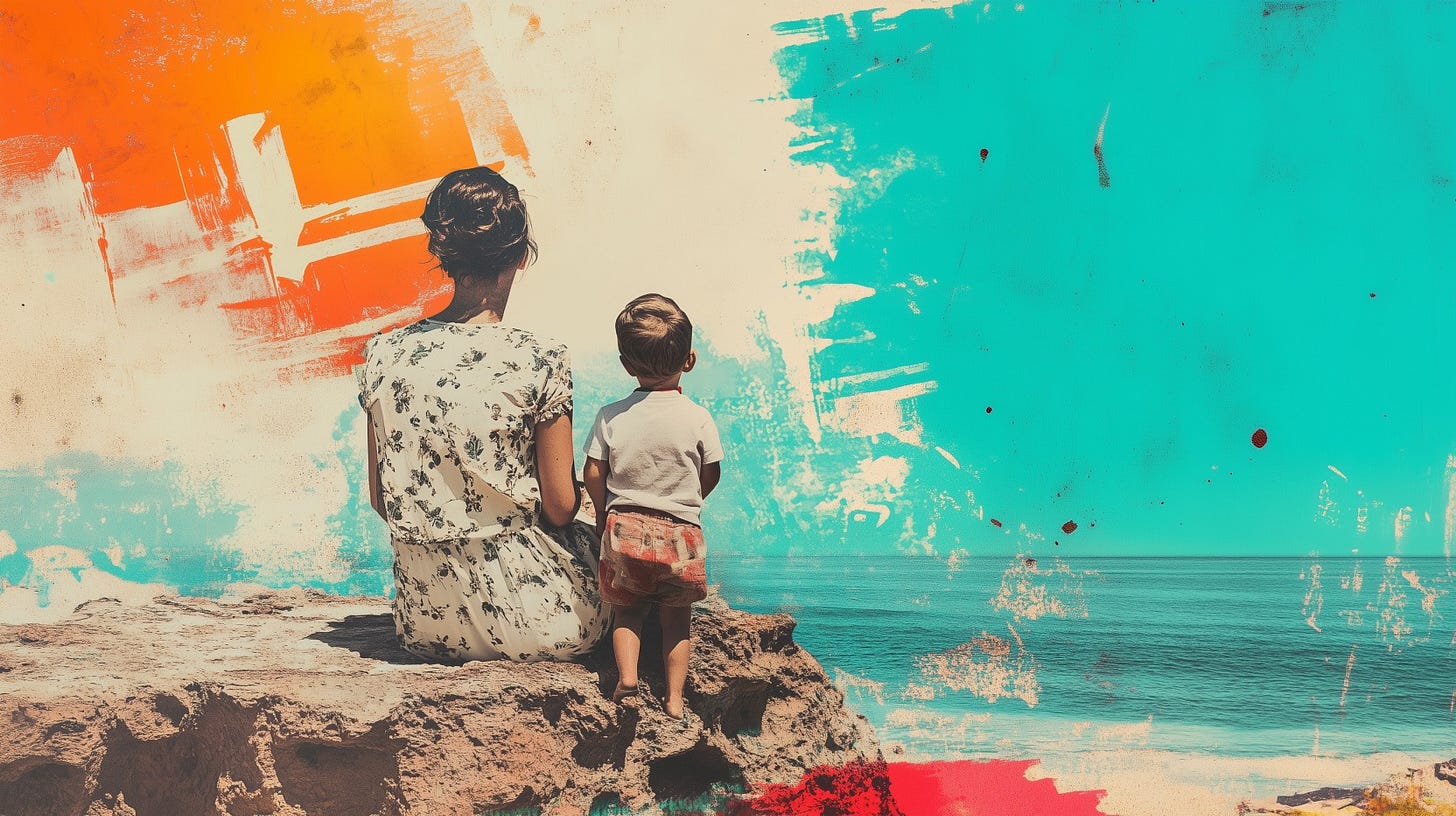I’m going to talk for a while here about the arts, and living, and making a living in the arts. I’m not sure I believe the following in its entirety, but I’m going to say it anyway — and would love to hear what you think in the comments.
THIS PIECE IS SPURRED BY THE BELIEF that we are on the verge of a deep and far-reaching crisis in the arts — as the activity is currently framed, and especially in the sense of it being a viable means of earning a living. Of course the AI apocalypse is part of this conversation, but a seismic change was coming down the pipe long before ChatGPT and Midjourney rocked up in their Teslas — and in fact is already here.
Making a living in the arts has always been tough. It’s going to get a lot tougher… because the arts are broken, from bottom to top. Let’s start at the top. Mass popular culture and the advent of international media generated the idea of “stars”, but the Internet and the “conveniences” of modern technology have now largely imploded it. Fewer stars are being created because all strands of entertainment have lost both their center of gravity, and any real sense of the “moment”.
Music has atomized into a thousand niches derived from playlist subsets of everything that’s ever been recorded. Event movies are dying because only dwindling numbers of intrepid humans will leave the house to schlep downtown to pay $20 for a movie they can watch in a few weeks while wearing their pajamas. The youngs (at least, the ones I talk to) seem to have no idea who the movie stars are even supposed to be, and are far more intimately in touch with what some random TikTok-er or YouTuber said about their unexceptional life ten minutes ago (I’m not wholly dismissing these people as “creators”, though their tendency to describe their own output as “content” tells its own story). An especially odd manifestation of all this is the rush now to digitize dead celebrities — making it all the more apparent that the Mainstream Entertainment Complex secretly knows that it’s lost the ability to generate new ones.
Meanwhile nobody has time to keep up with all the TV on all the streamers and so very few shows become cultural markers like they used to, not least because the “drop all the episodes at once” model made seasons that took two years to write and produce look like something free that falls out of the sky, like summer rain, and then is gone just as quickly from the public consciousness. How can it be worth anything if you can watch the whole thing in a weekend? How can this be art?
It’s not. It all becomes content, and “content” is produced merely to fill a space — not to create a space in the first place. Creating its own space is what art does.
Meanwhile all the aspiring creators out there are busy trying to turn themselves into niche “stars”. Substack Notes, for example, is currently full of writers (including some really good ones) justly bemoaning the fact that to build an audience there you have to spend so much time self-promoting (which in any event doesn’t often seem to work) that you wind up not having the time or headspace to do the thing you’re supposed to be promoting in the first place — i.e. your actual work. The all-hallowed “brand” detaches from the act of the writing (I’m sure this is true of artists and musicians too) and becomes an independent entity, forever hungry for more time and attention at the expense of the creative endeavor you wanted to promote in the first place.
The only Substacks that seem to be rapidly growing are liberal Twitter refugees, transporting their grifting audience-pleasing schtick through endless posts which boil down to “Strident left-of-center platitude! Drop a heart and retweet if you agree!!!” I’m a card-carrying and pretty shouty liberal myself, but this stuff is pointless and achieves nothing in the real world (as we calamitously witnessed in the recent election). It’s just driving engagement, building a brand, and making some cash.
As Milan Kundera put it in The Art of the Novel: “To please, one must confirm what everyone wants to hear, put oneself at the service of received ideas”.
Increasingly the brands that grow are the ones that don’t create, but regurgitate.
A Smaller Audience
I’ve been thinking about the idea of seeking a smaller audience for a while, since the phrase came up in wry conversation with my wife — and as a result of email exchanges and conversations with people starting out in the arts, during which I’ve found myself hard-pressed to give useful advice on how to find or build an audience.
The first thing to acknowledge, of course, is how the notion sounds. It naturally brings to mind this classic exchange in Spinal Tap…
And that’s funny because we’re all told that the most important thing in life, perhaps the only important thing, is finding a bigger audience. That’s how you get rich. That’s how you get famous. That’s how you get noticed — the be-all and end-all in our attention-based economy. The idea of turning your back on that paradigm is bizarre and risible, and I’m sure there are people reading this piece and already thinking: “Dude, is this a longwinded way of saying your book sales aren’t what they were and you’re trying to tell yourself that’s okay?”
No, it’s not. I have spent pretty much my entire adult as a “creator” (specifically in the shape of making shit up and writing it down). There are booms, and busts. I wearily accept that. I guess what I’m actually trying to do, in the face of a model for monetizing creativity that seems to be collapsing on multiple fronts, is to try to look at the enterprise in a new light — one that isn’t framed around ego, or wealth derived from forever chasing the largest and least discriminating audience you can find.
In social media, follower-count-mania is more obviously craven and easier to dismiss: though it’s a sad fact that new creatives now have their feasibility in the marketplace judged by how much of a social media audience they can bring, to do the marketing and PR departments’ jobs for them. But I’m not sure that model even works any more. The little people just can’t get famous enough. The market is too crowded and too noisy. The book market is dominated by super-sellers and celebrity authors. It’s hard for anybody else to get a look-in, especially since the “democratization” of the industry via self-publishing flooded the market with fizzy hopefuls who are better (or less squeamish) at pimping their brand than they are at actually writing.
And now, of course, there’s this shit, from a bunch of cloned smirking tech bros: “A new publisher has claimed it aims to “disrupt” the books industry by publishing 8,000 books in 2025 alone using artificial intelligence”. More noise. More crap. Making it even harder for the good stuff, the real stuff, to find an audience.
Getting your music discovered is a similarly uphill process in an industry skewed toward showing people the bands and styles they already know, making it very hard for new artists to break out. You can try to sell your CD at a gig but hardly anybody has players any more. So maybe ask them to pay $10 to download that you’ve laboriously created and recorded? No thanks… when that sum will pay the monthly nut on a service which will give them literally millions of songs by people who aren’t you. And that’s when you can get people to pay at all… since created objects became digital and thus not touchable “things”, lots of consumers seem to feel they should be free. You should see the abuse authors get when they dare to object to sites that push out pirated copies of our books. Suddenly we’re elitist gatekeepers and total fascists, capitalist pigs rather than people just to put food on the goddamned table.
In all of the above industries the discovery process is driven by algorithms we cannot influence and which are configured under the hood to favor certain kinds of creatives… mainly the ones passing over large sums in the smoky back rooms.
The ones who aren’t you.
Big tech is hardwired to stop new things creating new spaces. It is like the great big hand of some profit-hungry god, reaching down to flatten everything out.
A New Way, From An Old Way
I’m not trying to be a downer over all this, because I increasingly wonder if there’s a radical way of busting out of this cycle — or at least a different way of framing the nature and purpose of being creative. By making it personal again.
One of the few ways you can make sure that someone knows your work of creativity is not derived from artificial “intelligence” is if you hand it to them. If you play a song live, right there in front of someone, they know damned well you didn’t record it in AI. If they know you personally as a writer then they’ll believe the story you just gave them is your own work — because they understand you’d find the entire exercise empty and pointless otherwise. If you sell them a piece of art and they can see the paint still there under your fingernails, the work’s provenance will not be in question.
They know it’s actual art, because they know it’s a piece of you.
This is the way it was for tens of thousands of years. You would know the creator, or at least have the opportunity of seeing them do it in front of you. I suspect that was part of the point: “Look, this real person — who’s quite like me! — is doing this cool thing, right here and now”. Instead of the created “object” being divorced from its creator by thousands of miles of space and perhaps decades of time, it was something real and vital — part of a happening-right-now shared experience between the creator/performer and their audience… an audience who, rather than being mere consumers, would have included other creators and performers.
Because what is the difference between a great drawing of a tree and a well-ploughed field, or between a perfect horseshoe and a screenplay? Between a hit song and a home-cooked meal? Only the contrasting values our culture chooses to confer upon them. Only the difference in what you get paid in cash or attention. But at heart, isn’t your wife nodding with surprised approval at some new dinner dish you’ve just concocted, while your child quietly gets up to go serve themselves another helping, worth as much as selling a book in a country you’ll never visit, to someone you’ll never meet, and who then only gives it two stars on Amazon because they thought the type was too small? My readers are incredibly important to me and I’m very grateful for them — but which memory are you more likely to treasure on your deathbed?
I suspect I know my answer.
We can all create and we all do create. The only thing that blinds us to this fact is there is no A List for Blacksmiths, no Golden Globe for “Whoa, Mom Somehow Managed to Make Something Really Tasty Out of That Random Shit In The Fridge”.
The arts grew from two things: a desire to touch the sublime, and a wish to touch fellow humans and improve their lives by bringing something of beauty. Neither impulse inherently involves the idea of the process bringing wealth or fame, which is perhaps why the arts have been — for a vast majority of practitioners, since the dawn of time — a poor (or at least extremely risky) way of trying to earn a living.
And this perhaps confirms my assertion that fulfillment is far more likely to come from giving a thing you have made to one person, or small group, rather than from hoping it’s going to make you a millionaire via payment by strangers. People didn’t wander into villages and sing songs or put on a play in the hope of buying a yacht: they did it in hopes of seeing people laugh, or cry, and of earning enough coins to eat that evening and have somewhere to stay, before setting off to do it again the next day.
Creating isn’t a career path. It’s a way of being. It’s both a life and a life sentence. If you’re drawn to do it then you find it very hard to stop. Right now, on this Saturday night, I’m editing this piece. My wife meanwhile is making herbal products to sell. I wouldn’t want it any other way. This is not a brag, it’s self-knowledge. If I’m not writing, I’m sinking. We’re not special. You’re doing the same. You’re likely creating something. You may just not call it that.
And maybe — for worse, or perhaps better — the future of the arts lies partly in rejoining and re-elevating those original traditions through finding a smaller audience who actually value what you do, in and of itself: people whose life your work will genuinely enrich, rather than it being a case of you pulling them into the much thinner transaction of enriching your bank account or social capital.
Because that’s not supposed to be the point. In his book The Art of the Novel, Milan Kundera decries “GRAPHOMANIA. Not a mania to write letters, personal diaries, or family chronicles (to write for oneself or one's close relations) but a mania to write books (to have a public of unknown readers). The mania not to create a form, but to impose one’s self on others. The most grotesque version of the will to power.”
Creating for a smaller audience is not going to make us wealthy: we’re going to have to make our living somewhere else — or accept straitened circumstances as part of the deal, as so many in the creative arts do now, and always have. Perhaps there’s something in a return to the patronage model, under which so much extraordinary beauty — including a ton of Bach’s work — was created, before the modern world turned creativity into a fame contest. Sadly, the wealthy don’t seem much drawn to supporting the arts any more, except in the vainglorious (and tax-deductible) way of donating enough to have a concert hall named after them. It’s left to normal people.
In a way, that’s what’s happening with those who choose to contribute financially to this Substack (and I sincerely thank you for it). But whether you do or not, if you read these pieces then you (and I) know that you can reach out and comment, tell me if I’m right or wrong or as stupid as usual or even more stupid this time, engaging with a created thing and its creator, in real life. You can applaud in a way I’ll hear, or throw (metaphoric, and please keep them that way) rotten tomatoes that will actually land on my face. Which makes it all feel much more like part of my life, and like having a life.
Isn’t that what the arts are for?
I’ll stop talking soon, I promise
In his uplifting recent book Cheerfulness, Garrison Keillor (that dude is still killing it, now in his eighties) recounts: “My big success one week was a sonnet written at 5 a.m. on the day I suddenly realized was our wedding anniversary, an original sonnet written out in a clear cursive hand and set on the breakfast table for my wife to find. I heard her sigh with pleasure and she came into my workroom and threw her arms around me. One poem, one reader, one tight protracted embrace: an hour of work well spent. The rest of the day was all mishmash and goulash that wound up in the trash.” That is so often the way. Write for the crowd, and you write cheap bullshit.
We lost our focus on a smaller but genuinely and lovingly appreciative audience purely because of the growth of an international mass media designed to drive most of the profit into the pockets of people who didn’t even create any of this stuff, in the process cursing us with a culture full of kitsch, as Milan Kundera (ibid) defines it: “those who want to please the greatest number, at any cost.”
AI-generated entertainment is the apotheosis of kitsch, and as a result mass entertainment will increasingly be generated by Artificial Intelligence, that non-intelligence which takes human creativity and averages it out to the point where it is no longer human or creative. This will meet the needs of a lot of people, who simply desire something similar to what they’ve liked in the past (and I’m not here to judge them for that — we all want this kind of comfort from time to time).
If you crave another of those books where a detective does the kind of thing they usually do, or a generic epic fantasy tome, or a by-the-numbers TV show set in a hospital, it won’t be long before AI can provide you with these on an incessant basis. There will be some new niche employments for humans created in the meantime — just as people now earn a living writing prompts for AI to work from, I can foresee a job creating fake personalities to front the fake books and music splurged out by AI (because humans like to believe they’re being entertained by someone or something in particular)… but AI will be able to do both those jobs itself soon enough.
If you want to be surprised by actual art once in a while, however, to feel that shiver of the real, to experience a new imaginative space being forged right in front of you, then at least for the moment you’ll need to stick with human creators. They’ll be the ones who will bring passion and heart (as someone I was discussing this with recently put it) — and we enjoy heart and passion, and the personal, and the not-seen-before... and I believe some of us always will. The problem is that audience may not be big enough to provide sufficient hard cash to survive as a professional creator.
I’m not romanticizing the idea of artists starving in garrets, trust me — I’m too old for that crap, and beer and cat food don’t pay for themselves — only speculating about a possible future. I’m not saying it should be this way or that I want it this way, only that it might wind up being this way as a result of societal, cultural and technical forces outside our control.
It would be grueling but also have the benefit of returning creativity to something that all of us do, every single one, in the midst of our vivid lives, rather than a rarified celebrity-quest for the few. A more central component, perhaps, of the Aristotelian notion of Eudaimonia, a long-term flourishing of what gives meaning to individual human lives. The audience for the results of this will at least know that those who create have authenticity on their side. That they’re doing it for real, for the sake of it.
That’s worth something. In the end, is art anything bigger — and does it ever feel more vital — than a child saying “Look at what I made for you”? Or in advance of that, before a making process begins, them — or your partner, or a friend — saying: “Look at what I found”. That pretty shell on the beach, this unusual pebble.
That’s the practice of art at its most primal: drawing attention to something discovered out there in the world, or made via your mind or fingers. And then giving it to someone in particular, a person who you think will appreciate it.
That smaller audience. The real one.







I am paid to write for a living -- I write articles about technology for a software company and have done so for quite some time. When I was a kid, of course, this isn't quite what I meant when I said, "I want to be a writer when I grow up," but it's a good living and I enjoy it most of the time.
For a long time I figured I would eventually write a book or two, but the more I paid attention to the whole publishing thing, the more I realized that, even if I wrote something really terrific, it probably wouldn't get published, and if it did it probably wouldn't make any money. And since I write for a living already, it's really hard to get into it as a hobby.
The AI thing is just a whole other layer of shit.
I still need a creative outlet, however, so I started to get back into the visual arts (my original plan before I fell into an English degree). I wandered through painting and printmaking and textile arts and &c. to finally settle on ceramics. Now I use mud and fire to create actual physical objects that people can hold and use every day. Mugs are my favourite so far, because everyone has a favourite mug, and it makes me happy when someone's favourite mug is something that I created.
I guess my point is that each piece of pottery I make almost always has an audience of one. Not a specific person I have in mind when I make a thing, but a person who sees the thing and loves it so much that they'll pay $40 or $50 for it rather than going to Ikea and buying something functionally equivalent for $3. The tiniest of audiences.
There are some people who make an extremely lucrative living around making pottery, *but* those people generally spend more time _making content_ about making pottery rather than actually making pottery. It's exhausting to watch and something I'm not interested in doing at all.
I'll never get rich from making pottery, but I'm lucky because don't have to.
Anyhow. Maybe there's a point in there somewhere. Maybe it's that the idea of hustle culture is utterly exhausting and I'm so glad to see some artists stepping back from it.
This situation was set in motion about 20 years ago, when publishers couldn’t figure out what to do with websites, so they just stuck their magazine and newspaper content online for free. It didn’t matter much then because no-one wanted to read articles on a CRT monitor via a dial up modem, but over time it trained society to believe that content is supposed to be free. The next stage was publishers having to rely on advertising rather than paying consumers for income to pay creators, and now here we are. However, I think there is a tipping point on the horizon. In a year or two, the only writing most people will have easy access to will be produced by brand marketing folk, or A.I. In both cases, it will be bland, soulless, and trying to sell you something. I believe people are the same as they ever were, they want to read / watch / listen to stuff that moves and challenges them. The issue isn’t with the audience or the creators, it’s with the entities who have inserted themselves between those groups in order to leach money from both. I reckon a new zine era is coming, just via sites like Substack, where creator and consumer are in direct contact. It’ll be a traumatic transition, especially for those of us who make a living from creation, but I’m looking forward to seeing how things look out the other side…